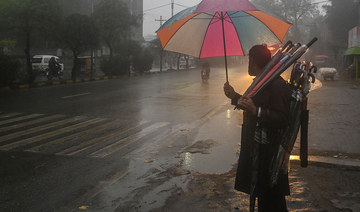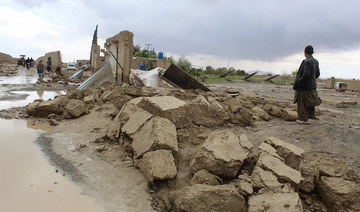LONDON: British Prime Minister Theresa May and opposition leader Jeremy Corbyn clashed over Brexit, the economy and security Wednesday in their final parliamentary exchange before June’s general election.
In a raucous session of prime minister’s questions in the House of Commons, the two leaders eyeballed each other while outlining competing visions as MPs behind them cheered and jeered.
May repeated her campaign mantra that only she can provide “strong and stable leadership” to guide Britain through its potentially tortuous exit from the European Union, and said her rival was “not fit to run this country.”
But Labour leader Corbyn went on the offensive over the government’s record on austerity and public services, saying May’s Conservatives “only look after the richest.”
May called the snap vote for June 8 to seek a mandate for Brexit and is expecting to win an increased Commons majority for her party.
The prime minister, however, has ruled out a television debate during the campaign, making Wednesday the last time she will go head-to-head against Corbyn before voters make their choice.
“Every vote for him is a vote for a chaotic Brexit. Every vote for me is a vote to strengthen our hand in negotiating the best deal for Britain,” she said.
Labour trail the Conservatives by more than 20 points in opinion polls, and the party is also divided over Corbyn’s left-wing leadership and strategy on Brexit.
“Even his supporters know he’s not fit to run this country,” May said, accusing him of uncosted spending plans and saying he was weak on defense.
Corbyn has pitched himself as the anti-establishment candidate and attacked the government’s record on the funding of schools and hospitals, as well as citing housing shortages and wage stagnation.
He said many Britons were “held back” by the government and “many people feel the system is rigged against them.”
“Strong leadership is about standing up for the many, not the few. But when it comes to the prime minister and the Conservatives they only look after the richest, not the rest,” he said.
Britain will not seek to take a divide and rule approach with the other 27 member states of the EU in upcoming Brexit negotiations, Brexit Minister David Davis said on Wednesday.
The remaining member states are due to meet at a summit on April 29 to endorse a common position, before negotiations begin in earnest after Britain’s June 8 election.
“There have been some suggestions that the UK might now seek to take a divide and rule approach to the union in the upcoming negotiations, far from it,” Davis told an audience of business people at a conference in London.
“We want the negotiations to be swift and effective ... Given the subject matter is complex and time is tight, the unity of the European Union will therefore be important for both sides.”
Davis said Britain should be under no illusions about the scale of the task ahead within the two-year negotiating time frame set out under Article 50 of the EU’s Lisbon Treaty.
“We are re-shaping Britain’s place in the world. Securing an agreement with the EU within the two-year period about our withdrawal and the shape of our future relationship will be challenging. We will have difficult issues to confront, compromise will be necessary on both sides,” he said.
He also said Britain was seeking to ensure a smooth and stable transition as it leaves the EU, but would need to take an “intelligent approach” to regulation in the years ahead.
“We must avoid unnecessary burdens on business, but we also want to make sure that our approach maintains or ensures new access to markets from Croatia to California, the regulations must have that in mind,” he said.
Meanwhile, British Prime Minister Theresa May on Wednesday held her first talks with key EU Brexit negotiators, as the bloc hardens its position ahead of a summit to lay down its “red lines.”
May hosted European Commission President Jean-Claude Juncker and chief negotiator Michel Barnier at Downing Street for the first face-to-face talks since she triggered the two-year process of withdrawing from the European Union.
The latest draft negotiating guidelines, agreed on Monday by Barnier and European diplomats, point to months of difficult talks ahead as the EU seeks to ensure Britain does not get a better deal outside the bloc than inside.
According to the document, seen by AFP, the other 27 EU countries will seek to hold Britain liable for the bloc’s costs for at least a year after it leaves in 2019 — longer than was previously proposed.
Britain will also be required to give EU citizens permanent residency after living there for five years, in a challenge for May’s Conservative government, which has vowed to limit immigration.
And the guidelines recommend that Britain’s dominant finance industry will not necessarily be tied to any future trade deal with the EU and that it must also stick to the bloc’s rules if it wants easy access to EU markets.
May has committed to pulling Britain out of Europe’s single market to end free movement of EU citizens into Britain, but says she wants to form a new partnership with the bloc.
“We will have difficult issues to confront. Compromises will be necessary on both sides. We know all this,” Brexit minister David Davis said in a speech in London on Wednesday.
But he added: “The UK has a very good reason to feel optimistic.”
After starting the Article 50 process of leaving the EU last month, May is seeking to shore up her mandate for the Brexit talks in a snap election on June 8, with polls suggesting her Conservatives will return with an increased majority.
In recent weeks, she has held talks with senior EU figures, including European Parliament President Antonio Tajani and European Council chief Donald Tusk, who visited Downing Street on April 6.
Her spokesman said the visits show that Britain “will be approaching the negotiations in a constructive manner and with great goodwill.”
But EU Commissioner Elzbieta Bienkowska warned in an interview with Germany’s Die Welt newspaper that Britain “can’t have everything in the end. They can’t have their cake and eat it.”
Nina Schick, associate director at advisory firm Hanbury Strategy, told AFP there was in a sense in Britain of “at best optimism, at worst just not understanding where the EU side is coming from.”
Schick, who works with the Open Europe initiative, said that the tougher guidelines “are not really a surprise” and that both sides were likely to “reiterate their positions” at the Downing Street talks.
British PM, Corbyn trade blows in final pre-election clash
British PM, Corbyn trade blows in final pre-election clash
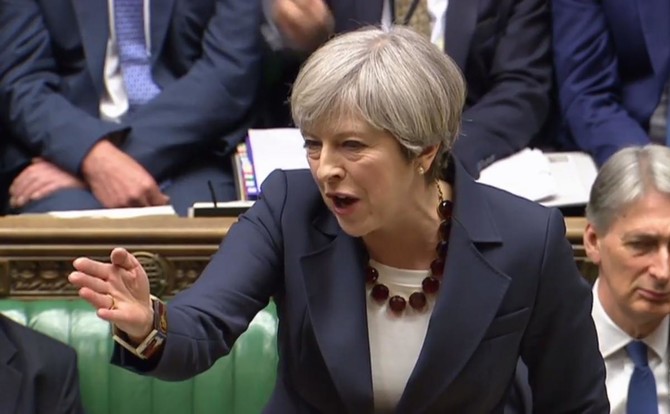
Macron blasts ‘ineffective’ UK Rwanda deportation law
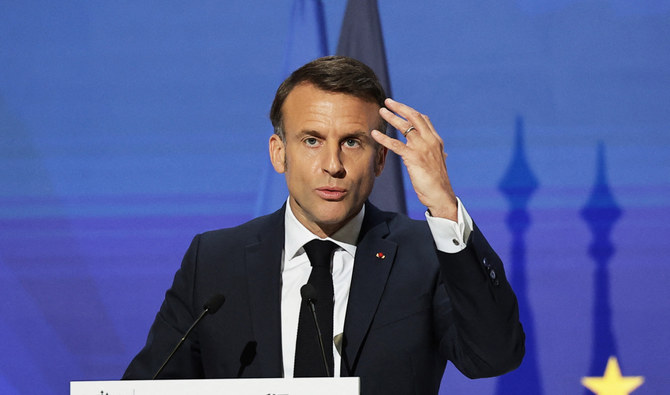
PARIS: French President Emmanuel Macron on Thursday said Britain’s plan to send asylum seekers to Rwanda was “ineffective” and showed “cynicism” while praising the two countries’ cooperation on defense.
“I don’t believe in the model ... which would involve finding third countries on the African continent or elsewhere where we’d send people who arrive on our soil illegally, who don’t come from these countries,” Macron said.
“We’re creating a geopolitics of cynicism which betrays our values and will build new dependencies, and which will prove completely ineffective,” he added in a wide-ranging speech on the future of the European Union at Paris’ Sorbonne University.
British MPs on Tuesday passed a law providing for undocumented asylum seekers to be sent to Rwanda, where their asylum claims would be processed and where they would stay if the claims succeed.
The law is a flagship policy for Prime Minister Rishi Sunak’s government, which badly lags the opposition Labour Party in the polls, with an election expected within months.
Britain pays Paris to support policing of France’s northern coast, which aims to prevent migrants from setting off for perilous crossings in small boats.
Five people, including one child, were killed in an attempted crossing Tuesday, bringing the toll on the route so far this year to 15 — already higher than the 12 deaths in 2023.
But Macron had warm words for London when he praised the two NATO allies’ bilateral military cooperation, which endured through the contentious years of Britain’s departure from the EU.
“The British are deep natural allies (for France), and the treaties that bind us together ... lay a solid foundation,” he said.
“We have to follow them up and strengthen them because Brexit has not affected this relationship,” Macron added.
The president also said France should seek similar “partnerships” with fellow EU members.
US alarmed by signs of ‘imminent military offensive’ in Darfur

WASHINGTON: The US has warned of a looming rebel military offensive on the Sudanese city of El-Fasher. This humanitarian hub appears to be at the center of a newly opening front in the country’s civil war.
After a year of fighting between the armed forces of Gen. Abdel Fattah Al-Burhan and the paramilitaries of the Rapid Support Forces, under Gen. Mohammed Hamdan Dagalo, millions have been displaced in the northeastern African country.
Until recently, El-Fasher — the last Darfur state capital not under RSF control — had been relatively unaffected by the fighting, hosting a large number of refugees.
But since mid-April, bombardments and clashes have been reported in the city and surrounding villages. The US “calls on all armed forces in Sudan to immediately cease attacks in El-Fasher,” the State Department said.
“We are alarmed by indications of an imminent offensive by the Rapid Support Forces and its affiliated militias,” it said, adding that “an offensive against El-Fasher city would subject civilians to extreme danger.”
After several days of “arbitrary shelling and airstrikes” in the city and its outskirts, a pro-democracy lawyers’ committee reported last week that at least 25 civilians had been killed.
Clashes in the eastern and northern parts of the city have already resulted in 36,000 displaced people, according to the UN’s Office for the Coordination of Humanitarian Affairs.
As the war enters its second year, the UN and US have warned the breakdown of the fragile peace in El-Fasher would be catastrophic.
The city functions as the main humanitarian hub in the vast western region of Darfur, home to around a quarter of Sudan’s 48 million people and the site of harrowing violence during this and previous conflicts.
The State Department said it had seen “credible reports” that the RSF and affiliated militias had razed multiple villages west of the city, while it condemned “reported indiscriminate aerial bombardments” in the region by Sudan’s armed forces.
Death toll in migrant boat capsize off Djibouti rises to 24: UN agency
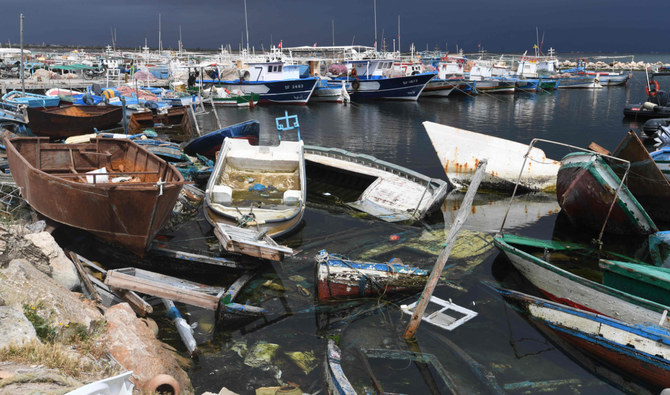
- 20 remain missing after the boat carrying at least 77 migrants, including children, capsized near the town of Obock
NAIROBI: The death toll from a migrant boat disaster off Djibouti this week has risen to 24, the UN’s migration agency said, highlighting a sharp increase in the number of people returning from Yemen to the Horn of Africa nation this year.
The capsize on Monday was the second fatal maritime accident in two weeks off Djibouti, which lies on the perilous so-called Eastern Migration Route from Africa to the Arabian Peninsula.
At least 24 people died, and 20 remain missing after the boat carrying at least 77 migrants, including children, capsized near the town of Obock, the International Organization for Migration said.
It said 33 survivors were being cared for at an IOM center in Obock and that local authorities are conducting search and rescue operations in the hope of finding more people alive.
Addis Ababa’s ambassador to Djibouti had said those on the boat were Ethiopian migrants.
Another vessel also carrying mainly Ethiopian migrants sank in the same area on April 8, with a death toll of at least 38.
“The occurrence of two such tragedies within two weeks highlights the dangers faced by children, women, and men migrating through irregular routes, underscoring the importance of establishing safe and legal pathways for migration,” IOM chief of mission in Djibouti, Tanja Pacifico, said.
The IOM said it had recorded a total of 1,350 deaths on the Eastern Route since 2014, not including this year.
In 2023 alone, it said it documented at least 698 deaths along the route, including 105 lost at sea.
The agency believed the people on both ill-fated vessels were attempting to return from Yemen to Djibouti.
Each year, tens of thousands of African migrants brave the Eastern Route across the Red Sea to reach Gulf nations, escape conflict or natural disaster, or seek better economic opportunities.
However, many are unsuccessful and “thousands are stranded in Yemen where they experience extremely harsh conditions,” the IOM said.
Since the start of 2024, the agency said 3,682 migrants have left Yemen for Djibouti, more than double the figure for the same period last year.
155 killed in Tanzania as heavy rains lash East Africa

- Kenyan president convenes emergency multi-agency meeting to respond to crisis after floods cause chaos
DAR ES SALAAM, Tanzania: At least 155 people have died in Tanzania as torrential rains linked to El Nino triggered flooding and landslides, Prime Minister Kassim Majaliwa said on Thursday.
Tanzania and other countries in East Africa — a region highly vulnerable to climate change — have been pounded by heavier than usual rainfall during the current rainy season, with dozens of deaths also reported in Kenya.
Majaliwa said the rains have affected more than 51,000 households and 200,000 people, with 155 fatalities and 236 injuries.
“The heavy El Nino rains, accompanied by strong winds, floods, and landslides in various parts of the country, have caused significant damage,” Majaliwa told parliament in Tanzania’s capital, Dodoma.
He added: “These include loss of life, destruction of crops, homes, citizens’ property, and infrastructure such as roads, bridges, and railways.”
El Nino is a naturally occurring climate pattern typically associated with increased heat worldwide, drought in some parts of the world, and heavy rains elsewhere.
It can have a devastating impact on East Africa.
In Burundi, around 96,000 people have been displaced by months of relentless rains.
In addition, about 45 people have been killed in Kenya since the start of the rainy season in March, including 13 who lost their lives in flash floods in the capital, Nairobi, this week.
Kenyan President William Ruto convened an emergency multi-agency meeting on Thursday to respond to the crisis after torrential rains triggered floods that caused chaos across the city, blocking roads and bridges and engulfing homes in slum districts.
Kenyans have been warned to stay on alert, with more heavy rains forecast across the country. Officials said people living in the most vulnerable areas would be relocated.
“The government ... will do whatever it takes, apply all the required resources in terms of money and personnel to make sure that lives are not lost and the people of Kenya are protected from this disaster,” Deputy President Rigathi Gachagua told a press briefing.
Meanwhile, the UN humanitarian response agency OCHA said in an update this week that in Somalia, the Gu (April to June) rains are intensifying, with flash floods reported since April 19.
It said four people had been reportedly killed, and at least 134 families or more than 800 people were affected or displaced across the country.
Late last year, more than 300 people died in torrential rains and floods in Kenya, Somalia, and Ethiopia just as the region was trying to recover from its worst drought in four decades that left millions of people hungry.
From October 1997 to January 1998, massive floods caused more than 6,000 deaths in five countries in the region.
In March, the UN’s World Meteorological Organization said that El Nino, which peaked in December, was one of the five strongest ever recorded.
Though the weather pattern is gradually weakening, its impact will continue over the coming months by fueling the heat trapped in the atmosphere by greenhouse gases, it said.
Therefore, the WMO said in a quarterly update that “above normal temperatures are predicted over almost all land areas between March and May.”
‘Uncommitted’ organizers will join campus protesters in Michigan over Gaza

- Student protests in the US over the war in Gaza have intensified and expanded over the past week
- Democrats have become increasingly uneasy over the US support for Israel as the death toll and destruction climb in Gaza
WASHINGTON: Organizers behind the “uncommitted” political movement against President Joe Biden’s staunch support for Israel’s war against Hamas will travel to the University of Michigan’s campus on Thursday to join students protesting the war.
Student protests in the US over the war in Gaza have intensified and expanded over the past week after police first arrested students at Columbia, with so-called Gaza solidarity encampments established at colleges, including Yale, and New York University. Police have been called in to several campuses to arrest hundreds of student demonstrators.
Uncommitted organizers will travel to the University of Michigan’s Ann Arbor campus, they told Reuters, bringing together a political movement that’s disrupted Biden events and amassed hundreds of thousands of votes in Democratic primaries and a student movement that’s drawn students and faculty of various backgrounds.
Biden won Michigan by less than a 3 percent margin in 2020.
Democrats have become increasingly uneasy over the US support for Israel as the death toll and destruction climb in Gaza. A growing revolt inside the Democratic base signifies the challenge Biden faces in bringing together the coalition he needs to defeat Republican frontrunner and former President Donald Trump.
“President Biden is choosing to put his hands over his ears and ignore the hundreds of thousands of people who have already come out against the war at the ballot box,” said Abbas Alawieh, a prominent “Uncommitted” organizer, who is going to Ann Arbor with Layla Elabed, another Michigan organizer.
“Signing into law more money for Israel is sending a clear message to uncommitted voters, young voters that he doesn’t care to engage seriously with our demands to end this war,” he said, referring to the $26 billion in new aid Biden recently approved.
Alawieh said the uncommitted movement has not been coordinating with student groups so far. “We have an electoral focus, but we certainly see the demands of student protesters, who are calling for peace,” he said.
On campuses where protests have broken out, students have issued calls for a permanent ceasefire in Gaza, an end to US military assistance for Israel, university divestment from arms suppliers and other companies profiting from the war, and amnesty for students and faculty members who have been disciplined or fired for protesting.
Biden told reporters on Monday that he condemned both “antisemitic protests” and “those who don’t understand what’s going on with the Palestinians.” Biden campaign spokeswoman Lauren Hitt has said the president “shares the goal for an end to the violence and a just, lasting peace in the Middle East. He’s working tirelessly to that end.”
Trump called the campus protest situation “a mess” as he walked into his criminal trial in New York.
The uncommitted movement amassed sizable vote totals in Michigan, Minnesota and Hawaii primaries and had won 25 delegates as of the beginning of April. They are preparing to target the Democratic National Convention in Chicago in August, where Biden is expected to be nominated.
Polls show Biden and Trump running neck-and-neck ahead of their Nov. 5 election rematch nationally. Biden’s 2020 victory was due to narrow wins in key swing states like Michigan.






